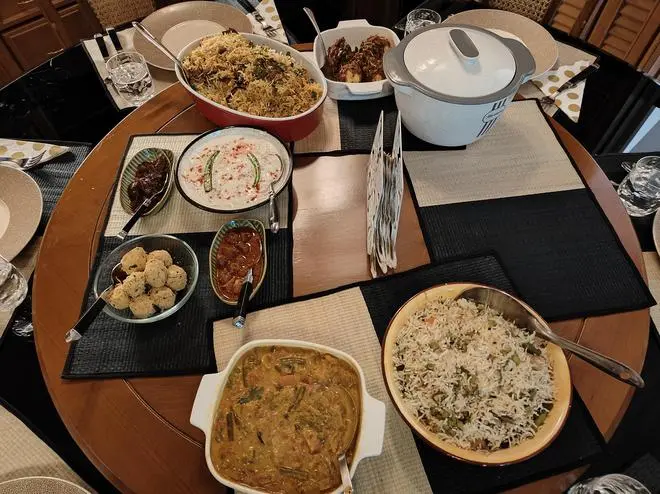American Airlines, the world’s largest airline, operates 6,700 flights a day. Often, it has four flights taking off at the same time from its hub, Dallas Airport. “Now suppose on any day, say between 7 am and 8 am, the airport is shut due to a storm. How can the airline quickly reschedule its flights? How can it re-accommodate passengers?” queries VK Mathews, founder of SaaS company, IBS Software. “By then some pilots and crew members might be exceeding their duty hours, creating complexity, as replacements will have to be quickly found,” he adds.
Enter the company’s iFlight software – a cloud platform that helps airlines manage operations, crew as well as disruptions. “If you look at the world’s top 20 airlines — 15 of them are our customers,” says the tall, strapping founder of the Thiruvananthapuram-based company. “American Airlines, Air Canada, LATAM Airlines, British Airways, Lufthansa, Air France, KLM, Emirates, Etihad, Singapore Airlines, Japan Airlines, Qantas, Air New Zealand all use our software,” he says. More importantly, IBS has a seat at the table at some airlines — our job is to make our customers succeed, if they succeed, we get more business,” he says, simply.
The take-off
Some 26 years ago, Mathews quit his job in Emirates as the head of the airline’s IT, because he spotted a gap. Today, he is sitting on a business that has been valued at $1.5 billion (a few months ago Blackstone sold its 30 per cent stake in the firm to Apax for $450 million) and powers the world’s biggest travel companies. “About 53 per cent of every piece of cargo that moves by air is managed by our software. And, if you set aside the homegrown loyalty programmes of companies like United and Delta, then 23 per cent of the loyalty business of airlines is run on IBS software,” says Mathews.
He describes how the company has developed five platforms for the travel sector. There is iFly which is all about airline retailing, reservations, passenger processing; iFlight which manages airline operations, crew rostering, disruption handling; iCargo which helps move airline cargo, iTravel Cruise which is for cruise liners and iLogistics which manages logistics in the energy business. “When it comes to the breadth of the portfolio of products in this specialised field, there is no other company that can offer as much to the airline industry. There are big companies that have more depth in certain products, of course,” he says.
Over the course of a three-hour long conversation at his elegantly designed multi-level home in Thiruvananthapuram, peppered with traditional Kerala snacks like achappam, rice halwa, home-made jackfruit chips, and the sound of an indoor waterfall gurgling pleasantly, one gets to hear the fascinating entrepreneurial journey of this aeronautical engineer who joined the Indian Army as a computer science teacher, moved to Air India as a systems analyst and then on to Emirates before taking the plunge into entrepreneurship. His smiling wife, Latha, adds occasionally to the reminiscences.

Mathews also segues into his philosophy on business and life — sharing anecdotes about his relationship with his father, a banker (he was one of Federal Bank’s founding managers) from whom he was deeply influenced. From him he learnt to always believe in the best in people and trust them.
The Army detour in his career was unexpected and unplanned. Born in Kizhakkambalam village of Kerala - which has been in the news for the model Panchayat run by Twenty 20, Mathews did his engineering studies in Kerala before joining IIT Kanpur for a post graduation in aeronautical engineering. He describes how in those days army officers would come for short courses to IIT and he saw the swag in their lifestyle — the Mess, the clubs and so on. He grabbed the chance to teach computer science to army officers, but though a conscientious teacher, much to his shock most of his class — all officers senior to him — failed. “I was too tough in my marking and expected too much,” he says.
Spreading his wings
Very soon he opted out and joined Air India and then Emirates in Dubai, where he spent 14 fulfilling years. “I had a very happy tenure there,” he says. He quit because while shopping for new technology for the airline, he could not find anything suitable. “By the 1990s, a burst of new technologies were coming in. But the Airline industry, which ironically was the first adopter of technology, was not able to use it as they were operating on legacy systems. My search to find a replacement for obsolete technology did not succeed. It was not only at Emirates, it was the cry of all airlines and I thought here was an opportunity,” he says.
But in 1997, Kerala where he chose to base his software company was not an easy place to start up, although the Technopark had come up. “Initially, I started by taking a huge loan — close to a million dollars. But how difficult it was for a company like us to start then — the rules were such that I had to buy the premises in Technopark,” he exclaims. “A considerable part of my loan was to acquire that space.”
Potential customers who wanted to see the IBS set up had to fly in through Mumbai as those days the only international flight from Thiruvananthapuram was an Air India flight to Dubai.
But despite the unfriendly business ecosystem, IBS did well till 2000, when Mathews hit the first air pocket. “It was nothing to do with the IBS business. That was the year when the technology bubble burst. I had supported some friends who started some internet companies and those failed,” he says.
He tided over that but then faced another big turbulence in 2002 when Swiss Air, which was IBS first client (Emirates was the second), and had become a partner in the company a couple of years before taking a 40 per cent stake, went belly up. “They were our biggest customer,” says Mathews describing how “well wishers” asked him to wind up the firm — advice he ignored. “It has not been a smooth journey — SARS was a problem for us, sub-prime crisis, then Covid when all travel stopped.”
But, says Mathews, “The confidence to overcome all the headwinds you face in business depends on the kind of backing you have from your team, the beliefs you have, the purpose of the organisation and how you are upholding it. We are in a difficult specialised field, and it is not very easy for a company from the third world to establish leadership.”
“I don’t think we have achieved it because we are the greatest in technology, but because we have the best value system. It’s quite an important factor, says Mathews, diving back to the first day — September 8, 1997 -— when he faced his employees, mostly young coders. “I didn’t speak anything about our business or technology. What I spoke about was the ingredients to become a good professional and build a great organisation,” he says.
“In fact, people only see success and failures, but they don’t know that the actual lessons in business and life are learnt from the nuances of your journey,” he says.

We are urged to continue the chat over lunch by Latha and move into the dining room where a delicious spread awaits us – appam, egg curry, stew, salad, daal, pulao, raita and a very tasty mango chammanthi. The dessert is payasam.
Navigating growth
How did the name IBS come about? Mathews smiles sheepishly and says he was inspired by IBM. “I think they are a great company,” he says.
The breadth of the portfolio that Mathews talks about and the formidable array of customers came about through a series of strategic acquisitions — eight in all. The first was TopAir in 2002, acquired from EDS in Switzerland. “It was an asset purchase,” says Mathews. The second buy was Avient Technologies from Honeywell, which managed Heathrow and Gatwick airports. “Honeywell had acquired Avient from Fujitsu but after September 11, it wanted to exit but at the same time wanted to sell to a company that could take care of its customers.”
“Then we went on to acquire companies in the hospitality and travel space. The idea behind the acquisitions was not to grow inorganically from X to 2X, but to acquire capability so that we could grow 4 X or more,” he says.
A series of funding enabled the acquisitions. Swiss Air had backed the company in 2000. In 2007, General Atlantic put in $60 million to acquire 22 per cent stake in IBS. In 2016 Blackstone came in, pumping in $178 million — “by then we had many rounds of dividends,” says Mathews.
Flight path ahead
What’s the vision for the next 25 years? “I look upon my entrepreneurship as a journey towards a destination that does not exist,” says Mathews with a benign grin. He says during the pandemic the company did not let go any employee, instead investing in R&D to make its product portfolio stronger. IBS has attempted to list twice in the market, but the timing was not right both times — one was in 2020. “We will go public but not in India. It will be in NYC,” he says.
His two daughters, both settled in Dubai, are involved in the company — the younger one even plays an active role in the Board. “She was in IBS, then went to work at Morgan Stanley and now she is back,” says Mathews.
“You don’t have any Indian airlines as clients,” you ask. “We had Kingfisher and Jet,” responds Mathews. “Indian civil aviation is one of the most difficult businesses to succeed in. The cost of operation, aircraft maintenance, fuel, airport fees are all higher here. And ticket prices are cheaper. “If you look at the average ticket fare, it is just 60 per cent of the fare outside India,” he says. But if anybody can make a successful global flight path, Indigo and Air India have that opportunity,” he concludes.









